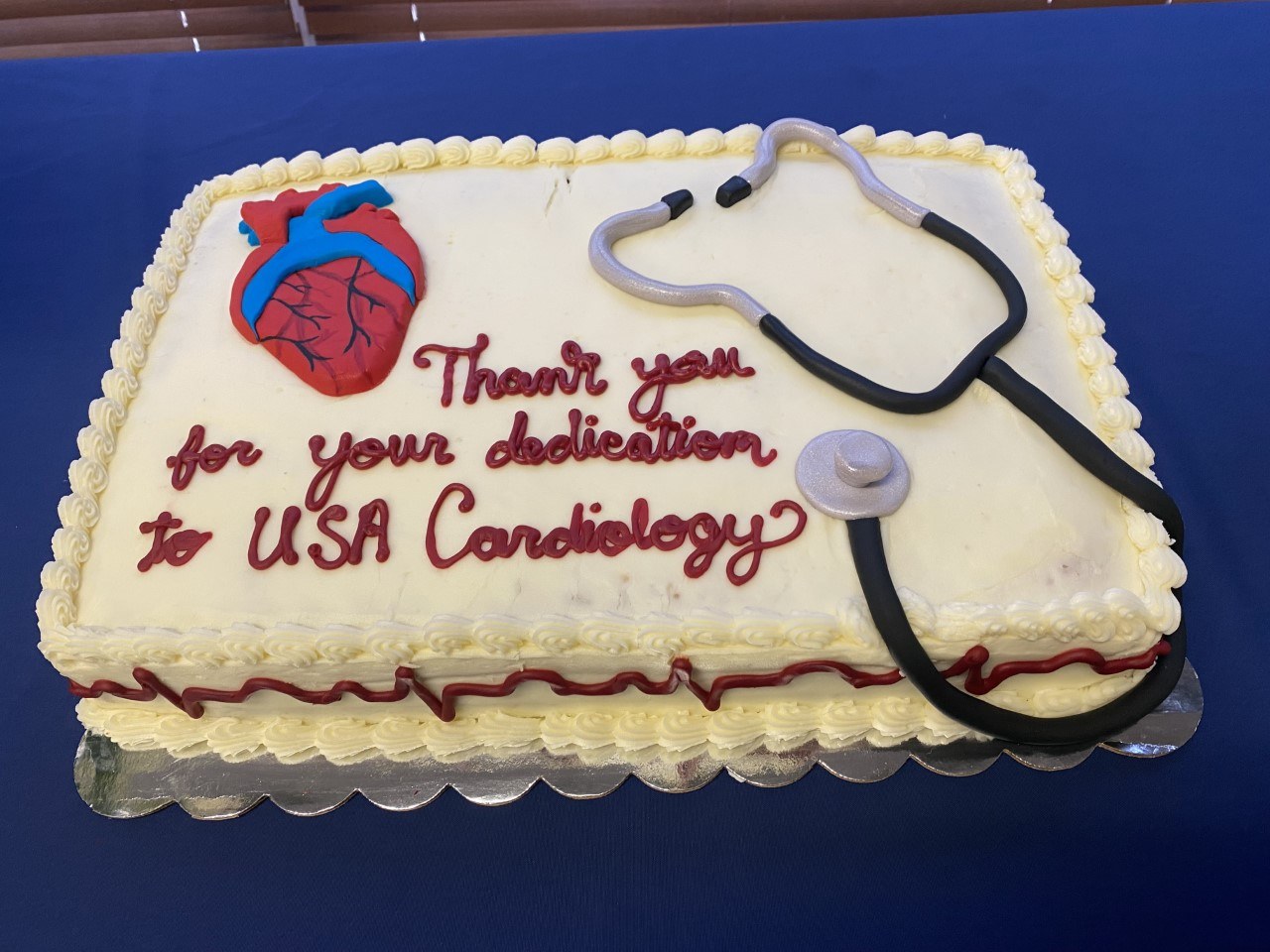
Newly created endowment recognizes Omar for dedication, generosity, scholarship
The endowment will provide funding for cardiovascular research and scholarly activities that promote the educational research missions of the Whiddon College of Medicine, the Department of Internal Medicine, and the division of cardiology.
By Michelle Ryan
[email protected]
Among the lengthy list of achievements Bassam Omar, M.D., Ph.D., FACC, cardiologist, director of the cardiovascular diseases fellowship and professor of internal medicine, has accumulated over the years, some have been noticed and even appreciated, but never officially recognized. That is, until now.

Christopher Malozzi, D.O., cardiologist and associate professor of internal medicine, knew of Omar’s generosity with his time and knowledge from his days as a cardiovascular disease fellow at the Whiddon College of Medicine.
With the help of Kelly McCarron, associate vice president for medical affairs, USA Health Development, Malozzi discovered the possibility of creating a named endowment to honor his longtime mentor, colleague and friend. In March, Omar was presented with a check and certificate recognizing the establishment of the fund created in appreciation of his years of education, scholarship and dedication.
The creation of the endowment in Omar’s name helps express not only Malozzi’s thanks, but also that of the graduates of the cardiovascular disease fellowship whom Omar has trained, mentored and championed over the years.
“During his tenure, he has graduated 24 fellows, me included,” Malozzi said. “Over nearly 20 years of stewardship of cardiovascular education at USA, Dr. Omar’s dedication is unrivaled. He has given of his time, his money and his knowledge to produce the best cardiology education experience for his trainees.
“Over the years there have been countless examples of his dedication,” Malozzi said. “He has provided extra lectures and materials for board prep, and meals and snacks for hungry fellows. He renovated a call room, provided babysitting services for fellows in need, promoted all our scholarly endeavors and helped us all achieve more than we could have ever imagined.”
The cardiovascular disease fellowship, one of the Whiddon College of Medicine’s longest-tenured fellowship programs, counts among its graduates many who have gone on to successful careers in the field. Some have built practices in Mobile, and others have established thriving practices nationally and internationally.
“This is a big surprise, absolutely, and it’s wonderful, a wonderful thought,” the soft-spoken Omar said after the presentation. “The success is really the success of the program here and everyone else that contributes to it. We have been through a lot of changes, and I am very appreciative of my colleagues.”
The endowment will provide funding for cardiovascular research and scholarly activities that promote the educational research missions of the Whiddon College of Medicine, the Department of Internal Medicine, and the division of cardiology. It will also provide a means for current and future fellows and graduates to give back to the program responsible for their invaluable training and successful careers.
Omar graduated from medical school at the American University of Beirut, Lebanon. In 1989, he arrived at USA as a research associate in the department of biochemistry, where he completed his Ph.D. before leaving in 1990 for a postdoctoral fellowship at the Webb-Waring Lung Institute at the University of Colorado Health Science Center in Denver.
He finished his residency in internal medicine at the Emory University School of Medicine in Atlanta before returning to USA for a cardiology fellowship in 1994. Upon its completion, Omar began his career at the U.S. Department of Veterans Affairs Medical Center in Asheville, North Carolina, and later moved to the VA in Biloxi, Mississippi.
In 2002, he was recruited back to USA as a part-time faculty member and joined the division of cardiology full time in 2004. He oversaw the cardiovascular disease fellowship in 2004 as an assistant director, then was promoted to program director in 2009.




